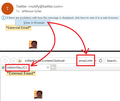
Internet Explorer is grabbing browser links
In the past few weeks when I click in an Outlook email "click here to view it in a web browser", the page is opened by Internet Explorer. It used to be Firefox. How can I clear out IE? Firefox is listed as the default browser. Interestingly when I posted the question, the contents of this message was deleted and was not sent. Is that MS at work?
تمام جوابات (8)
Hi, make sure that all the Firefox default settings are correct: Make Firefox your default browser
Hold down the Shift key when you start Firefox to start in Safe Mode. More - Diagnose Firefox issues using Troubleshoot Mode.
If it works in Safe Mode, disable any theme or extensions you have - 3-bar menu > Add-ons > Themes/Extensions, then restart Firefox; now if it's still OK, re-enable them one by one until you find the culprit. You may need to restart Firefox after enabling some extensions.
If your question is resolved by this or another answer, please help other users by marking the best reply as Solved. Thank you!
Thank you for the speedy response. However. Starting in safe mode then opening a browser from the Outlook email message still went to Internet Explorer.
There is a special feature of Microsoft Office Outlook that it can reformulate some messages in a local file saved in MHTML format. The link is in the message header instead of the message itself.
(See attached screenshot)
<center> </center>
</center>
Usually the default browser for MHT files continues to be Internet Explorer because Firefox cannot render them correctly. For that reason, Firefox does not make itself the default browser for .mht files or the mhtml: protocol.
Older versions of Firefox supported legacy extensions that could decode and display MHT files, but as far as I know, that isn't an option for Firefox 57 and later -- unless there's a new add-on I don't know about.
Thank you for that news. Isn't MS kind to us!
Does anyone know a work-round either in Outlook (stopping this "feature") or in Firefox? Even the notification email sent to me opens in IE.
Most messages should display fine in Outlook and not need to be opened in a browser. That isn't your experience?
In order to open your message (which I received by email), I have to open it in my browser. If I click the link in the message header, I get IE. In order to open it in Firefox I have to click on the links internal to the message.
MS is being disengenuous. The text says that the message should be visited in "a" web browser. But it actually means IE, and certainly not Firefox.
cvhorie said
In order to open your message (which I received by email), I have to open it in my browser.
That's strange. I probably only need to use the "View in Browser" feature a couple times a year.
I have the latest version of Outlook (from Office 365) and use the Reading Pane on the right side (folder list on the left, mailbox list in the middle, message selected in the list displays on the right).
It sounds as though something is not quite right with your Outlook installation or configuration if it can't display messages itself.
I believe that you can workaround this by adding the sender to your contact list within Outlook.
By doing so, you are essentially trusting all the contents contained within emails from this sender (including any previous and new ones). Note, as this will bypass some of the built-in security features, be sure that you are very confident and trust the sender implicitly. While I am not an expert, viruses or malware can also be in-bedded within images and rendering them automatically within your email client is one of several reasons you may not wish to do this.
Contingent on your level of comfort with the sender (be they vendor, service, friend or whomever) remember that you are diminishing the security of your inbox and this may be especially true with the viewing pane active. Simply viewing the contents of an email can also allow the sender to collect data of your online behavior.
While the sender may simply be doing so for legitimate marketing analytics, they may also attempt to monetize the collected data and/or provide it to a third party. Remember that you are essentially providing confirmation to the sender of a valid email address, your clicking behavior and probably much much more than you realize.
Hopefully my response adequately answers your query.
Happy Day to one and all!

